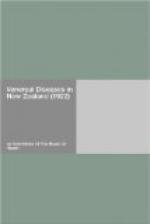Another important Commission, sitting almost simultaneously with that just referred to, was the National Birth-rate Commission, which began its labours on the 24th October, 1913, and presented its first Report on the 28th June, 1916. The Commission was reconstituted, with the Bishop of Birmingham as Chairman, in 1918, to further consider the question, and especially in view of the effects of the Great War upon vital problems of population. Among the terms of reference the Commission were requested to inquire into “the present spread of venereal disease, the chief causes of sterility and degeneracy, and the further menace of these diseases during demobilization.” The Commission in their report, presented in 1920, stated that they realized the difficulties involved in the introduction of any efficient scheme of compulsory notification and treatment of venereal diseases, but, they added, they “feel that it has now passed the experimental stage both in our colonies and in forty of the forty-eight of the United States of America, and think it is advisable for the State to make a trial of compulsory notification and treatment in this country, provided that there should be no return to the principles or practice of the Contagious Diseases Act.” Referring to the finding of the Royal Commission on Venereal Disease that it would not be possible at present to organize a satisfactory method of certification of fitness for marriage, the National Birth-rate Commission thought this question should now be reconsidered with a view to legislation. “If,” says the report, “a certificate of health was to become a legal obligation for persons contemplating marriage, many of the legal, ethical, and professional difficulties surrounding this question would be removed.”
In Sweden, where a Venereal Diseases Law was passed in 1918, stress was laid on the importance of general enlightenment with regard to venereal disease and germane subjects, such as sex hygiene. A committee was appointed, consisting of experts in medicine and pedagogy, to inquire into the best means of providing such education. Their report, which has just been issued, is described by the British Medical Journal as a document of considerable value, promising to become the charter of a new and complete system of sex education and hygiene in schools throughout Sweden. Further reference will be made to this document in the section of this report dealing with education.
The subject of venereal disease has also been considered by more than one important Medical Conference in Australia and New Zealand.




